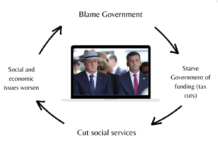The Issue
David Seymour is loosening regulations and qualifications for Early Childhood Centres, removing government signoff for new centres. These steps mean there will be lower standards of care, oversight and education.
The outcome is that it will be even more attractive for businesses to establish low-quality new centres.
The Chief Executive of the Early Childhood Council, Simon Laube, claims that regulations “don’t make sense,” while we consider regulations are essential for ensuring enriched education and safe care of children.
Ominously, in the light of the above developments, the Government also intends “to review all regulations governing the early childhood education sector.”
Context and Response
The underlying problem is that ECE is largely private (60%), profit-oriented, and often foreign-owned.
QPEC argues that ECE should be publicly funded under public control. It would then serve the public good, with demonstrable oversight and standards for childcare and education,
ECE should be publicly owned and delivered
A major problem with the ECE sector is that a large part of it is for-profit, privately owned, and in many cases, part of foreign chains.
In its place, QPEC argues for public ownership in a partnership model with Government and community
ECE is a high-stakes issue at a vital, formative stage in children’s lives. Children need and deserve the very best opportunities, as do their parents. We argue for full state provision and funding, in partnership with relevant communities, rather than the current 60% private ownership.
At present, the state subsidises the sector and private companies; profits go overseas to external companies, rather than to support the sector; parents pay handsomely for ECE places; the sector stays under-resourced and under-renewed.
In 2023, there was serious focus on ECE through mainstream media via radio and print, through political party statements, and through a University of Waikato webinar with Canadian specialists in ECE funding.
It had become clear that there were serious concerns with the use of public funds and with the standards of many ECE centres. It was reported that “a serious chunk of $2.3 billion a year in taxpayer funding is collected by for-profit providers and passed on to investors,” in a sector that is over 60% privately owned.
Michelle Duff reported, “Industry watchdogs said monitoring was haphazard, allowing businesses to cut corners in staffing and resources and jeopardise child safety.”
Previously in the NZ Herald, Professor Linda Mitchell noted the closure of 10 privately owned centres post-lockdown. She quoted a Ministry of Education official: “allegations of physical or emotional injuries inflicted on children, including verbal abuse, isolation of children and physical harm, poor curriculum quality, a lack of staff and poor learning support.”
Mitchell summed up: “It is scandalous such ECE centres are allowed to exist, propped up by government funding. This was made possible by the ease with which private owners can establish a childcare ‘business’ without having any ECE expertise themselves, access government funding, determine their own staff pay and conditions, and operate with insufficient accountability for their use of funds.”
Then in The Post, Jan 2, 2024, Prof Mitchell posed this question about ECE: “Is it a private commodity, accountable to shareholders and business owners? Or is it a democratic, public, universal, education-based system that benefits all children and families?”
QPEC argues that there are numbers of distinct advantages to public ownership:
- ECE would serve the public good, not private profit-making
- it would be NZ-owned, not foreign-owned and directed
- it could ensure public oversight for standards of staff, curriculum, management, child care
- it could ensure suitable education content
- the public funds currently supporting foreign and private entities could go directly into financing public ECE
- ECE could become a free service




